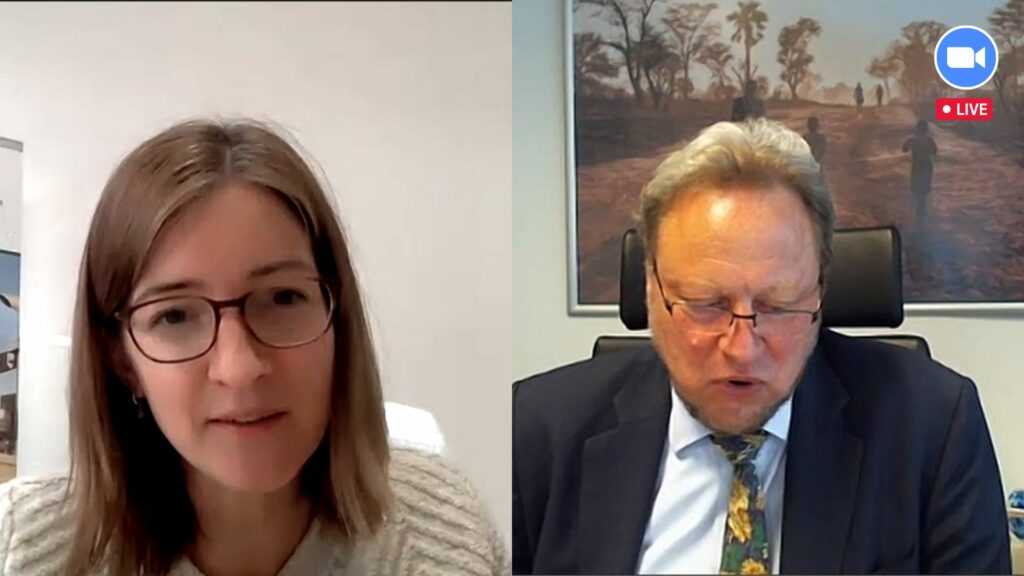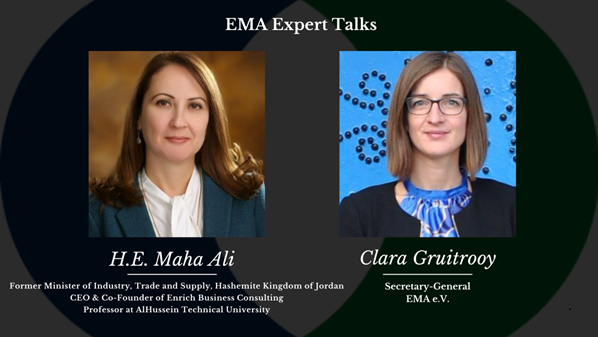As EMA, we firmly believe that global cooperation among countries and organizations could be an effective tool to strengthen, share, and accelerate development within countries and across regions.
In order to keep our network updated and businesspeople well informed about current developments in their country of interest, the EMA Expert Talks series will provide them with credible information from ambassadors, high-ranking officials, CEOs, and other experts with a variety of backgrounds.
Lebanon is facing a political, financial and economic crisis as well as an alarming brain drain. Results of the crisis were GDP contracting by 20% in 2020, a sovereign default on debt, and inflation rising to 90%. The country is at the brink of collapse, undergoing water, fuel and electricity shortages. Three quarters of the population are now living below the poverty line.
What are immediate measures that have to be taken in Lebanon to remedy the crisis? How can the international community support these efforts? What is the role of Lebanese women and the diaspora in the recovery?
EMA Secretary General Clara Gruitrooy spoke about these questions with Youmna Naufal, director at Brunswick Group in Abu Dhabi. She is an accomplished Lebanese American journalist. She is also the founder, producer and host of “Y Chats”, a show with Lebanese guests geared towards the youth. In the interview, Mrs. Naufal shares her insights into the situation and her hopes for a better Lebanon.
Last summer, H.E. Fathallah Sijilmassi was awarded the Honorary Membership of the EMA at the 1st Mediterranean Summit. Even then he stressed the need to rethink Euro-Mediterranean-Arab relations and pointed to the Arab-German mentoring program Ouissal, which the EMA initiated together with the German government, as an outstanding example.
In this EMA Expert Talk, H.E. described his assessment in more detail and advocates for a stronger Euro-Mediterranean-African partnership. How does the Covid-19 pandemic influence relations and perspectives between Europe and its Southern neighbors? Which role can organizations like the EMA play, particularly during the German presidency of the EU Council in this second half of 2020?
H.E. Fathallah Sijilmassi is an advocate of Euro-Mediterranean-African cooperation. He began his political career in the Ministry for Foreign Trade of the Kingdom of Morocco and filled the positions of director in the department for multilateral cooperation in the Ministry for Foreign Affairs and Cooperation and later of director in the department for European affairs. H.E. was appointed Moroccan ambassador to the European Union and later to France. Then he was Secretary General of the Union for the Mediterranean between 2012 and 2018.
In the summer of 2020 he published his book L’avenir de l’Europe est au Sud (The Future of Europe is in the South). It is available for download here.
More cooperation, economic opportunities, and the new normal: EMA Secretary General Clara Gruitrooy spoke with Nezahat Baradari, Member of the German Parliament, about the following questions: How do German-Turkish relations develop during the pandemic? How can cooperation between the EU and its Mediterranean partners be strengthened despite or even with Covid-19? Find the answers in the interview.
Nezahat Baradari became a Member of Parliament a little over a year ago. Before she accepted her mandate as a member of parliament, she was a practicing pediatrician in her own clinic. Mrs. Baradari speaks about her motiviation to join politics, her activities in social media, and her commitment to a growing partnership between the EU and the Mediterranean countries. Moreover, she addresses German-Turkish relations and how both countries tackle the Covid-19 pandemic.
Only recently did the Egyptian businessman Samih Sawiris (CEO, Orascom) acquire the majority shares in Europe’s third largest tourism operator FTI Group. The EMA seized this opportunity to take a closer look at this economic sector that has been affected severely by the Covid-19 pandemic. What do global travel restrictions mean for tourism operators? How can tourism benefit from digitization? And when can we travel again?
EMA Secretary General Clara Gruitrooy spoke with Roula Jouny, managing director at FTI, about these questions. Born in Lebanon, Mrs. Jouny commutes a lot between Germany and the various FTI locations worldwide – normally. But for several weeks now she has been spending her time in her home office in Dubai where the Covid-19 developments took her by surprise. She is also the founder and CEO of Meeting Point International (MPI), a destination management company. In the interview, Mrs. Jouny shares her insights into the expectations of the tourism sector for traveling in 2020 and reveals where she prefers to spend her vacation.
Since the beginning of the Covid-19 pandemic, the EMA would haven visited Tunisia twice already in these days. We are therefore even happier that we have organized a virtual trip to Tunisia despite the restrictions of public life. We are there to meet decision makers, business associations, and political representatives to speak about digital transformation, the IT economy, and continued German-Tunisian cooperation.
Compared to other Arab and African countries, Tunisia has navigated well through the Covid-19 pandemic. Social, fiscal, and financial measures support the economy which is scheduled to go back to normal by late June. What does that mean for German companies? And what role does digitization play in Tunisia?
EMA Secretary General Clara Gruitrooy spoke about these questions with the EMA partner and chairman of the Tunisia Investment Authority (TIA) Beligh Ben Soltane. He is an international marketing specialist and expert for foreign direct investment, who had already been active for the Tunisian Foreign Investment Promotion Agency FIPA before accepting his position at TIA.
EMA Expert Talk | Virtual Inaugural Visit with New UAE Ambassador H.E. Hafsa Al-Ulama - May 12, 2020
H.E. Hafsa AlUlama, the new UAE ambassador to Berlin, only arrived in Germany in March, at the onset of the Covid-19 lockdown. Yet she has taken to virtual inaugural visits such as that with the EMA. EMA Secretary General Clara Gruitrooy spoke with the ambassador about the great efforts the UAE has made to handle the pandemic, in particular while dealing with the simultaneous challenge of the oil price collapse. What does this mean for the Expo2020 in Dubai? And what can Germany learn about digitization as a means to overcome the crisis?
How does the EUCommission coordinate with its member states and the countries of the MENA region and Africa during the Covid-19 pandemic? How does Brussels look at the measures taken by its southern neighbors and future exchange with that region? To answer these questions, EMA Secretary-General Clara Gruitrooy spoke with Michael Koehler, Deputy Director-General for humanitarian aid.
Egypt on the holidays: This year on April 20, more than 100 million Egyptians celebrated the spring festival Shamm el Nessim. Every year an occasion for family visits, holiday shopping, and weekend trips to the sea. But this year, when the Covid-19 pandemic is dominating everyday life, a lot is different. Many Egyptian provinces closed their borders in order to prevent the expected seasonal travel to the Mediterranean and Red Sea coasts. The coastal metropolis of Alexandria, in turn, closed all city beaches weeks ago and today the coastal road Corniche was blocked for all traffic.
Check our Events below:


